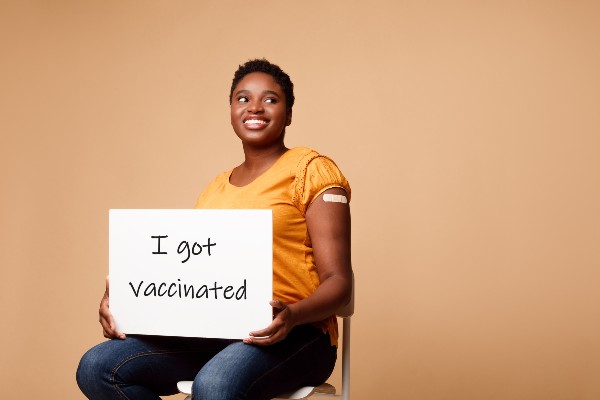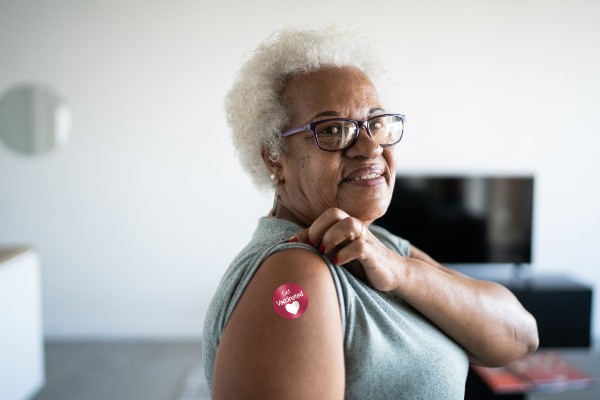Schedule your vaccine appointment today.
Riverside began administering the COVID 19 vaccine in December of last year, rolling out hundreds and then thousands of doses to health care workers, frontline responders in the community, and eventually to residents throughout its service area. But the high demand that marked the beginning of the vaccine rollout has slowed as even more doses are made available throughout the country. Experts refer to this as “vaccine hesitancy,” and many fear that a slowdown in vaccinations could stall the early progress and slow a return to normal activities that marked pre-pandemic life.
Are you wondering if you should get the COVID 19 vaccine? Are you confused by conflicting information that you may see on social media or hear from friends and family?
We sat down recently with Kathy Koehl, System Director, Clinical Pharmacy Services, to talk about the most common concerns and misconceptions about the COVID 19 vaccine and important considerations for people who might be hesitant about getting the vaccine.
Getting the COVID 19 vaccine will protect you and those around you, especially vulnerable populations.
The most important reason to get the vaccine is to protect yourself from getting very sick or dying from COVID 19. The vaccines approved for use in the U.S. help your body develop antibodies that fight COVID 19. This protection prevents anyone from severe illness or death.
Communities of color represent a much higher percentage of patients who have been hospitalized or died from COVID 19. Vaccination provides critical protection, particularly if you are a minority with a job that exposes you to greater risk like being a frontline health care or other essential service worker.
Older patients or people with underlying health conditions may not always be eligible to receive the COVID 19 vaccine. Still they remain vulnerable to the harsh effects of contracting COVID 19, including a much greater risk of hospitalization and death. Even if you consider yourself at low risk for being critically sick from COVID 19, getting vaccinated will protect those people around you who are most susceptible.
The faster we can vaccinate communities, the sooner we can return to normal.
The pandemic has left us nostalgic for everyday activities that we once took for granted. Most of us long to return to workplaces, busy shops, live sporting or concert events, and gatherings with friends and family. Maybe you want to travel without quarantine limitations. With every vaccination, we are closer to a point when we can safely resume these activities.
We should trust the science and the rigorous scientific process that developed the COVID 19 vaccines.
There has been a lot of public concern that the COVID 19 vaccines were produced quickly and “rushed” through approval, leaving many people skeptical of the long term effects. While the COVID 19 vaccines are new, the technology used to develop them has been around for decades and studied in vaccines around the world for diseases like the flu, rabies, and tuberculosis.
Once developed, each COVID 19 vaccine manufacturer conducted clinical trials on tens of thousands of patients worldwide – including people of different races and ages – to test the safety and efficacy of these vaccines.
The vaccine does not contain any live virus, so there is no risk of contracting COVID 19 from the vaccine. Some people report soreness at the injection site, mild fever, or body aches as the body works to develop antibodies. These symptoms do not last long (typically only a day or two) and are a sign that the immune system is responding to the vaccine. You can also have no side effects to the vaccine and still develop protection from the virus.
The COVID 19 vaccine provides extra protection to people who have recovered from the virus, is safe for breastfeeding mothers, and has not been shown to impact fertility. The vaccine does not alter DNA, which is another misconception.
Getting the COVID 19 vaccine delivered to people quickly is the best way to overcome the pandemic.
Like any virus, COVID 19 is changing and it is crucial to stay ahead of the variants in order to be most effective. Hesitation to vaccinate prolongs our ability to reach a critical mass and reduce the threat to everyone. The COVID 19 vaccine provides protection, but until most people are vaccinated, you will still need to wear a mask, wash your hands and practice social distancing.



